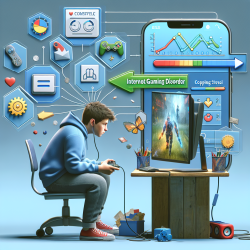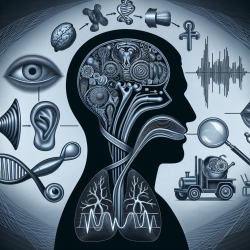Introduction
In the digital age, the prevalence of internet gaming disorder (IGD) among adolescents has become a growing concern. The study titled "Effectiveness of a mobile app-based educational intervention to treat internet gaming disorder among Iranian adolescents" offers a promising approach to addressing this issue. By utilizing a mobile app-based intervention grounded in the Transtheoretical Model (TTM) and Cognitive Behavioral Therapy (CBT), this research provides valuable insights for practitioners seeking to enhance their therapeutic strategies for IGD.
Understanding the Study
The study conducted a randomized controlled trial involving 206 high-school adolescents in Qazvin, Iran. Participants were divided into an intervention group receiving an app-based educational program and a control group receiving sleep hygiene education. The intervention, delivered through the app HAPPYTEEN, consisted of eight sessions over two months, focusing on stages of change, self-efficacy, and decision balance.
Key data collection tools included the Internet Gaming Disorder Scale, Insomnia Severity Index, and Depression, Anxiety, and Stress Scales. These measures were assessed at baseline, post-intervention, and one and three months after the intervention.
Implications for Practitioners
The study's findings suggest that app-based interventions can be an effective adjunct therapy for adolescents with IGD. For practitioners, this highlights the potential of integrating digital tools into therapeutic practices. Here are some practical steps practitioners can take:
- Incorporate Technology: Leverage mobile apps and online platforms to deliver CBT and TTM-based interventions, making therapy more accessible and engaging for adolescents.
- Focus on Behavioral Change: Use the TTM framework to guide adolescents through the stages of change, enhancing their self-efficacy and decision-making skills.
- Monitor Progress: Utilize digital tools to track patients' progress, ensuring adherence to treatment and providing timely feedback.
- Enhance Engagement: Incorporate interactive elements such as videos, quizzes, and motivational content to maintain adolescents' interest and commitment to the intervention.
Encouraging Further Research
While the study provides a robust framework for app-based interventions, further research is necessary to explore its long-term efficacy and adaptability across different cultures and settings. Practitioners are encouraged to participate in or initiate studies that expand on these findings, focusing on diverse populations and varying intervention durations.
Conclusion
The integration of mobile app-based interventions in treating IGD among adolescents offers a promising avenue for practitioners. By embracing technology and data-driven approaches, we can create more effective and accessible therapeutic solutions for young individuals struggling with gaming addiction.
To read the original research paper, please follow this link: Effectiveness of a mobile app-based educational intervention to treat internet gaming disorder among Iranian adolescents: study protocol for a randomized controlled trial.










